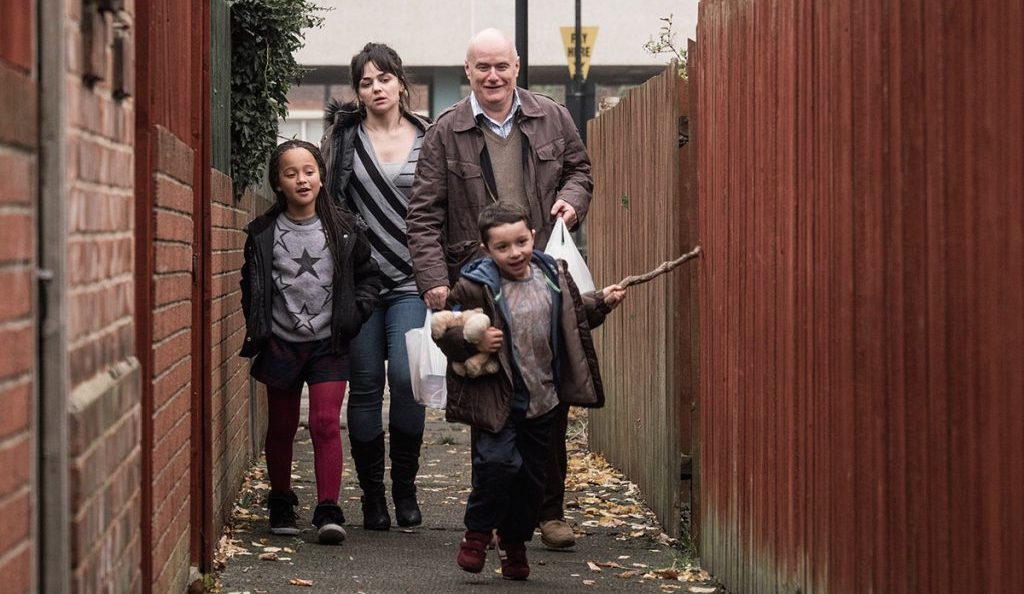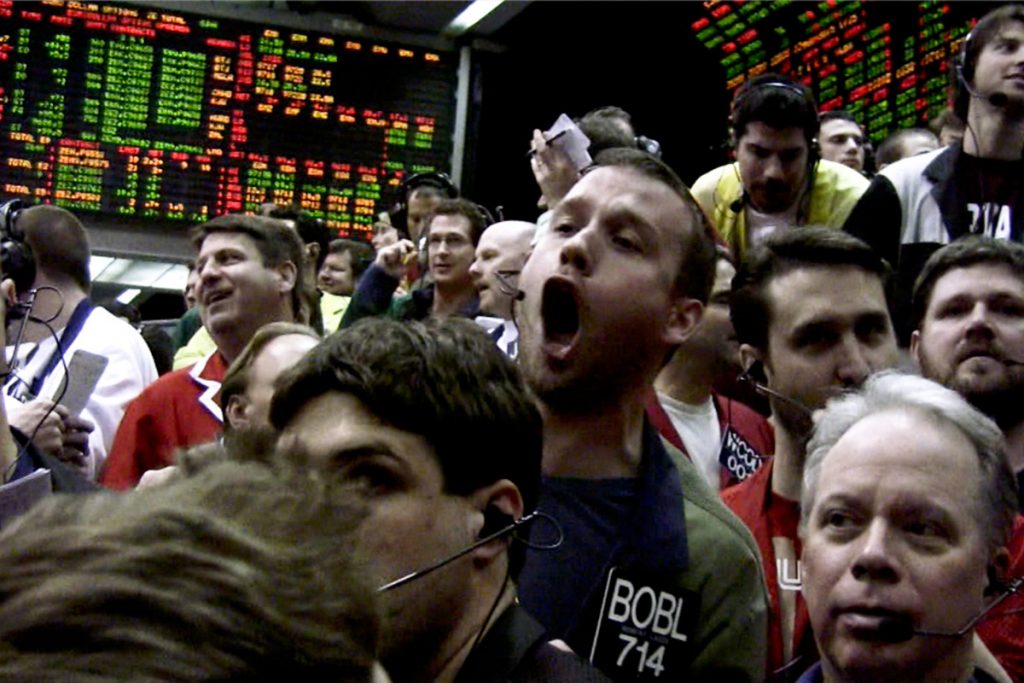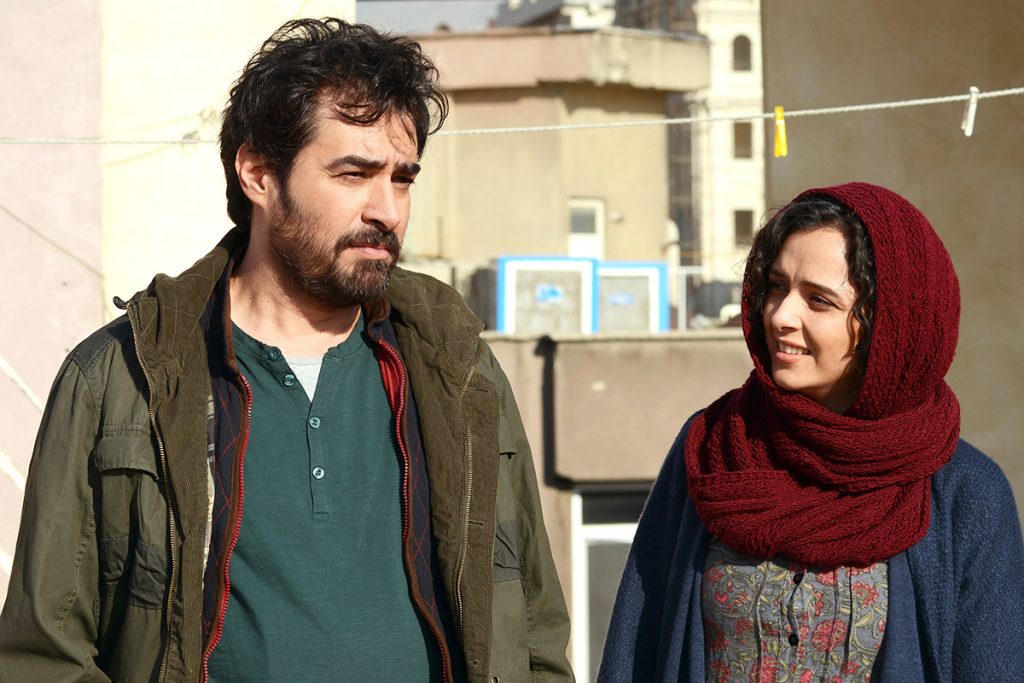
Now in its 52nd year, the Chicago International Film Festival exposes local moviegoers to the latest works from the world’s greatest filmmakers, the initial films from newer talents destined for greatness, revivals of classics to pay homage to the storied history of the cinema and decidedly offbeat items to suggest where the art form might be heading in the future. What they haven’t quite been able to pull off, especially in recent years, is the trick of coming up with a worthwhile film to kick off the proceedings. For whatever reason, the festival has struggled to acquire a strong and distinct title for the Opening Night gala, whether it's the aggressively bland (such as last year’s “Mia Madre”) to the downright awful (yes, the unspeakably awful Uma Thurman comedy-drama “Motherhood” really did open the 2009 edition). Even when they do happen upon a strong one, like James Gray’s “The Immigrant,” which played in 2012), it seems more like an accident than anything else.
For this year’s edition of the festival, running October 13-27, founder and artistic director Michael Kutza and his team of programmers have not only compiled a strong lineup of over 125 feature films (not counting several programs of short films) from more than 50 different countries—they have also arranged to kick things off for once with an Opening Night selection that is easily one of the very best films of the year.
That movie is “La La Land,” Damien Chazelle’s utterly endearing follow-up to his 2014 hit “Whiplash.” Set in Los Angeles, it tells the story of Mia (Emma Stone) and Sebastian (Ryan Gosling), a couple of people struggling to make their dreams—she wants to be an actress and he is a jazz musician who wants to one day open his own club—who meet, eventually fall in love and try to maintain their relationship while trying to keep from throwing in the towel on their ambitions. Oh, did I mention that the film is also a full-blown, honest-to-goodness original musical as well? From the stunning opening song—a full-blown production number set amidst a traffic jam and done in what appears at first glance to be a single shot—to a knockout final sequence that pretty much covers the entire emotional gamut, the film is an absolute delight from start to finish that confirms Stone and Gosling (who previously appeared together to winning effect in “Crazy. Stupid. Love.”) as two of the most exciting and charismatic actors of their generation and shows that Chazelle (whose “Whiplash” I didn’t particularly care for) is indeed the real deal. Chazelle and co-star Rosemarie DeWitt are currently scheduled to walk to the red carpet and present the film.

“La La Land” is by no means the only high-profile item screening at this year’s festival. Among the titles on display, “I, Daniel Blake” (10/22, 10/25), which won the Palme d’Or at Cannes earlier this year, sees British filmmaker Ken Loach telling the story of a carpenter recovering from a heart attack and a single mother who become friends while trying to navigate through an endless array of bureaucratic hurdles in order to receive the benefits due them. “Lion” (10/25) features Dev Patel, Rooney Mara and Nicole Kidman in the inspiring true-life story of a young Indian boy who, after being accidentally separated from his family and adopted by an Australian family, sets out as an adult to find his real home with the aid of Google Maps. “Jackie” (10/17) finds Natalie Portman stepping into the shoes of Jacqueline Kennedy in a film that looks at her in the days immediately following the assassination of her husband. The director of that film, Pablo Larrain, will be pulling double duty this year as another film of his, the self-described “anti-bio” “Neruda” (10/16, 10/17), which follows poet Pablo Neruda as he goes on the lam after the government of Chile puts out a warrant for his arrest, is one of the titles in this year’s International Competition. Another competition title, “Christine” (10/15, 10/16) showcases Rebecca Hall in a strong performance as Christine Chubbuck, a real-life Florida newscaster driven by her demons and thwarted professional ambitions to shoot herself during a live broadcast in 1974. Acclaimed filmmaker Terence Davies returns with “A Quiet Passion” (10/16), an unconventional biopic of famed poet Emily Dickinson, played by Cynthia Nixon. Poetry also figures into Jim Jarmusch’s “Paterson” (10/15), which follows the ritualistic day-to-day existence of an ordinary New Jersey bus driver (Adam Driver) and his wife, whose own life is changing in surprising ways. The festival closes with another big title in “Arrival” (10/27), Denis Villeneuve’s eagerly anticipated and decidedly hush-hush sci-fi drama about a top linguist (Amy Adams) who is employed to figure out a way to communicate with the alien spacecraft that have been landing across the planet.
As usual, there are a number of sidebars designed to highlight certain specialized types of films. One of them will be spotlighting musicals and in addition to “La La Land,” it will be featuring such selections as the charming Belgian musical comedy “Belgian Rhapsody” (10/23, 24), the modern day Bollywood fable “Mirzya” (10/22) and the highly anticipated 3-D animated musical “Trolls” (10/24), featuring the vocal talents of Justin Timberlake, Anna Kendrick and Gwen Stefani.

The long-running Black Perspectives program will include such highlights as “Moonlight” (10/26), Barry Jenkins’ critically acclaimed look at a young man struggling to define himself while undergoing the process of falling in love, a restored print of Julie Dash’s influential 1991 historical drama “Daughters of the Dust” (10/23) and a tribute to Steve McQueen (10/22), the celebrated artist and director of such films as “Hunger,” “Shame” and the Oscar-winning “12 Years a Slave.”
The festival's Out-Look program, which concentrates on films with LGBT themes, includes such films as “Being 17” (10/23, 10/24), a look at the unexpected relationship that develops between two high school boys from French director Andre Techine. Another title of note is “Strike a Pose” (10/19, 10/22, 10/23), which catches up with the backup dancers who shared the stage with Madonna on her landmark 1990 “Blonde Ambition” tour to examine how that experience shaped their lives.
New ideas in genre filmmaking are explored in the festival's After Dark program, which includes such sure-to-be-controversial items as “Raw” (10/21, 22), a grisly French item about a vegetarian veterinarian student who, after being forced to eat raw meat as part of a hazing ritual, undergoes the kind of bizarre personal changes that had some viewers fainting in their seats when it screened at the Toronto International Film Festival; “Prevenge” (10/21, 10/23), a British entry in which writer/director-star Alice Lowe plays a pregnant woman who is convinced that her unborn child is commanding her to kill people; the wildly violent Indonesian action extravaganza “Headshot” (10/22, 26); and “We Are the Flesh” (10/16, 10/21), a Mexican entry from newcomer Emiliano Rocha Minter (presented by Carlos Reygadas and Alejandro Inarritu) that offers a hallucinatory stew of sex, violence, cannibalism and insanity that makes the works of Jose Mojica Marins—the one and only Coffin Joe—seem like child’s play by comparison.

Although the scope of the festival as a whole is international, local filmmakers have also been given their chance to shine as well. Steve James, the director of such celebrated documentaries as “Hoop Dreams,” “The Interrupters” and “Life Itself,” returns with “Abacus: Small Enough to Jail” (10/18), an examination of the only bank to date to face criminal charges as a result of the 2008 financial meltdown—a small concern run by a Chinese immigrant family in the Chinatown section of New York. Charlie Siskel, the co-director of the acclaimed “Finding Vivian Maier,” presents “American Anarchist” (10/15, 10/16), a look at William Powell, the man who at age 19 wrote the controversial manifesto “The Anarchist Cookbook” and who now, in his 60s and an educator himself, harbors regrets about what his words have wrought over the years. “Futures Past” (10/14, 10/18, 24) is a ten-years-in-the-making documentary about Leo Melamed, the creator of the Chicago Mercantile Exchange, made by his son, Jordan. “The View from Tall” (10/20, 10/21, 10/24) is an oddball comedy-drama from local theater names Caitlin Parrish and Erica Weiss that charts the unusual friendship that develops between a lonely, bullied and sarcastic high school girl and the disabled therapist she is forced to start seeing after it is discovered that she has been having sex with one of her teachers. To mark the 30th anniversary of the festival’s world premiere of the horror classic “Henry: Portrait of a Serial Killer,” a never-before-shown 4K restoration will be shown with director John McNaughton and star Michael Rooker scheduled to attend.
Other big names will be on hand for tributes to their work as well. On October 15, Geraldine Chaplin will be honored with a tribute hosted by historian David Robinson and presented with the Career Achievement Award for a filmography including such classics as “Doctor Zhivago,” “Nashville” and “Welcome to L.A.” in a ceremony held at her father’s old stomping grounds at Essanay Studios (1345 W. Argyle St.) Festival regular Claude Lelouch will be on hand to present a 50th anniversary screening of his 1966 breakthrough “A Man and a Woman” (10/15, 10/18) and as well as his latest film, “Un + Une” (10/14,10/18). Alfonso Arau will arrive on October 17 to screen his international hit “Like Water for Chocolate” (which won the festival’s Audience Choice award in 1992) and receive the Festival Artistic Achievement Award. The prestigious Gold Hugo Lifetime Achievement Award for this year will go to noted filmmaker Peter Bogdanovich, who will also be on hand to introduce both a rare screening of “They All Laughed” (10/17), an absolutely wonderful romantic comedy with a cast featuring the likes of Ben Gazzara, John Ritter, Dorothy Stratten, Colleen Camp, a scene-stealing Patti Hansen and, in her last big-screen starring role, the iconic Audrey Hepburn, as well as “One Day Since Yesterday: Peter Bogdanovich and the Lost American Film” (10/16), a documentary that traces examines his career as a whole and focuses on the making of “They All Laughed” and why it is likely that you have probably never even heard of it, let alone seen it before.
Now, these are five of the films in no particular order that are especially worth checking out:

"The Salesman": Asghar Farhadi, the Oscar-winning director of the powerful Iranian drama “A Separation” returns with the story of a Tehran couple (Shahab Hosseini and Taraneh Alidoosti) who, while in the midst of co-starring in a stage production of “Death of a Salesman,” are forced out of their architecturally unstable apartment. A co-worker on the play hooks them up with a new place to stay but fails to fully disclose who the previous tenant was, an omission that will prove to have disturbing and tragic consequences for a number of people as a result. Once again, Farhadi (who received a Best Screenplay award at Cannes for the film) demonstrates himself to be a master at creating exquisitely detailed narratives that simultaneously deal with broad social issues regarding life in contemporary Iran as well as more personal and emotional elements. The end result is a deceptively subtle narrative that few will be able to shake afterwards, containing knockout performances from Hosseini (who took home the Best Actor prize at Cannes) and Alidoosti that are among the best you will see this year. (10/16, 10/19).
"The B-Side: Elsa Dorfman's Portrait Photography": The great documentarian Errol Morris, director of such landmark works as “Gates of Heaven,” “The Thin Blue Line” and “The Fog of War,” returns with a cinematic profile of longtime friend Dorfman, a photographer who came to shoot such 60s icons as Bob Dylan and Allen Ginsburg and who was one of the first to utilize the large-format cameras made by Polaroid that offered up stunning images. With the announcement that Polaroid was no longer making film for that camera, she chose to retire and Morris shows her going through her studio and reminiscing about the past. The film is both a sweet tribute to a friend and an elegy to an art form that has sadly been pushed aside in the name of price and convenience. While it may not be as powerful or as revelatory as his most famous works, the film is still a valuable and fascinating work from one of our most valuable and fascinating filmmakers. (10/15, 10/17)
"The Handmaiden": On the surface, this adaptation of the novel by Sarah Waters sounds staid enough—during the time of the Japanese occupation of Korea in the 1930s, a young woman joins forces with a swindler to get hired as the handmaiden to a Japanese heiress in order to help him elope with her, steal her fortune and toss her in an insane asylum. But she soon finds her loyalties wavering when an undeniable attraction begins to develop between her and the heiress instead. Now imagine that narrative in the hands of Chan-wook Park, the South Korean director of such generally strange, sometimes grotesque and fairly unforgettable works as “Oldboy,” “Lady Vengeance,” “Thirst” and “Stoker.” Needless to say, the results are strange and seductive in equal measure (this is the rare erotic thriller that actually remembers to be, you know, erotic) as Chan-wook weaves a tantalizing spell that not even an admittedly hefty two-and-a-half-hour running time can dissipate. As with “Elle,” this is a film that you will either love or hate. Whichever way you lean, you're not likely to forget any of it anytime soon. (10/23, 10/25)
"The King of Jazz": Produced in 1930, this film was designed to showcase the talents of Paul Whiteman, a hugely popular musician and orchestra leader whose nickname supplied the title. Forgoing even the most rudimentary elements of a straightforward narrative, it instead employs a revue format that intersperses a number of elaborate production numbers (including a complete performance of “Rhapsody in Blue” that has to be seen to be believed) with comedy skits, a bit of animation from Walter Lantz that is said to be the first cartoon produced in Technicolor and even a performance featuring the vocal stylings of a then-unknown crooner by the name of Bing Crosby. Produced for the then-astronomical sum of $2 million dollars, the film was a huge flop when it was released and soon slipped into obscurity. Now, Universal Pictures has brought it back via an elaborate restoration project so that new generations can get a chance to bask in its utter weirdness. It may not be the greatest film ever made—some of the comedy interludes are pretty excruciating—but as a glimpse as to the state of popular American entertainment circa 1930, it is a valuable, fascinating and strangely entertaining trip to another time. On hand to help explain the history of the film and its restoration will be David Pierce, co-author of the book, King of Jazz: Paul Whiteman’s Technicolor Revue. (10/16).
"Elle": Throughout his career, Paul Verhoeven has thrived on provoking and challenging audiences in the past with such in-your-face works as “Turkish Delight,” “Robocop,” “Basic Instinct,” “Showgirls,” “Starship Troopers” and “Black Book” but even those almost pale in comparison with his latest jaw-dropper. In one of the great performances of her career, Isabelle Huppert stars as the head of a video game company whose cool and detached demeanor, both in the boardroom and the bedroom, is the result of a shocking childhood trauma. Her perfectly compartmentalized life is thrown into upheaval when, in the opening seconds, a masked assailant breaks into her home and rapes her. Without going into specifics, let me say that her reaction to this assault is not what one might expect and kicks off a story filled with crazy twists and turns, jolts of bracing dark comedy (including a Christmas party straight out of Bunuel) and moments that will leave even the hardiest of viewers reeling. Many viewers will no doubt be outraged by this film and Verhoeven’s take-no-prisoners approach—I prefer to think of it as one of the best and most audacious films of the year. (10/20)
Screenings for the 52nd Chicago International Film Festival will take place at the AMC River East 21. Tickets can be purchased in person at the theater, online at chicagofilmfestival.com and ticketmaster.com/chicagofilmfestival or over the phone at (312)-332-FILM. For further information on titles, running times, ticket prices and availability and program changes, go to the festival site at chicagofilmfestival.com.
Peter Sobczynski is a contributor to eFilmcritic.com and Magill's Cinema Annual and can be heard weekly on the nationally syndicated "Mancow's Morning Madhouse" radio show.





